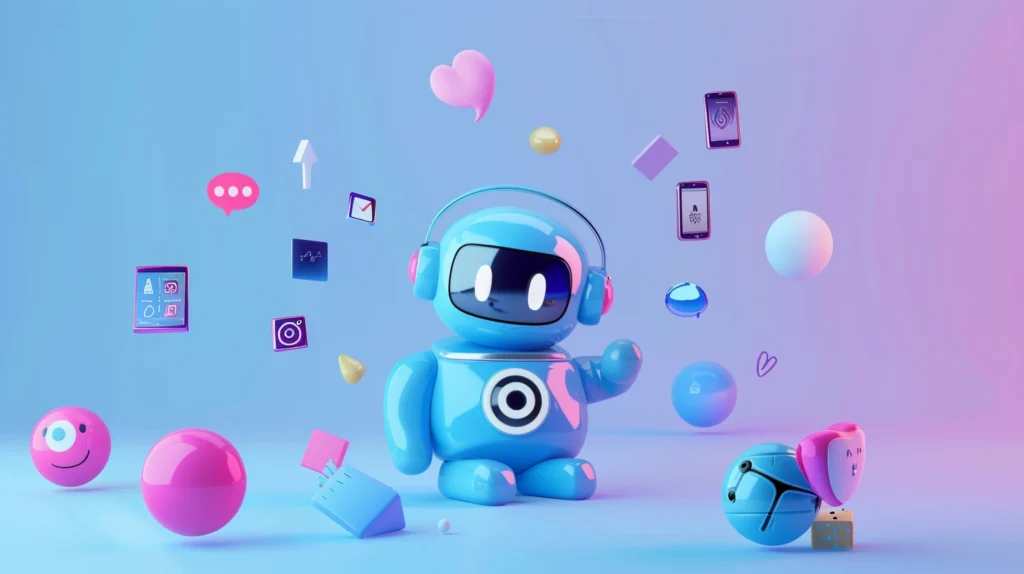Maximizing AI Marketing Outcomes: Leveraging Artificial Intelligence for Enhanced Strategy and Results

The landscape of marketing is undergoing a transformation, requiring new methods to improve the customer journey, streamline processes, and achieve better outcomes.
Traditional marketing strategies are no longer sufficient as brands seek innovative ways to engage with their audience. The need for personalization and predictive analytics is becoming increasingly apparent.
AI is at the forefront of this revolution, offering fresh chances to redefine the rules of engagement between brands and consumers. This article delves into the dynamic impact of AI in marketing, highlighting how it is reshaping brand-audience interactions.
Key Takeaways
Elevate your marketing strategy with AI.
Tailor this prompt to your company’s needs and discover the potential of AI in achieving your marketing objectives.
AI marketing harnesses artificial intelligence technologies to make automated decisions based on data collection, data analysis, and additional observations of audience or economic trends that may impact marketing efforts. By integrating AI into marketing strategies, businesses can achieve more personalized customer experiences, efficient ad targeting, and improved ROI. Here's how to explore the implementation of AI in marketing to drive significant results:
### Customizable Prompt for Implementing AI in Marketing Strategies
"How can [Company Name], looking to enhance its marketing strategies and drive better results, leverage artificial intelligence across various marketing channels to achieve [Specific Goals, e.g., improved customer engagement, higher conversion rates, efficient ad spend]? Consider the integration of machine learning, predictive analytics, and AI-driven content creation in the process."
#### Areas to Explore:
1. **Customer Data Analysis and Segmentation**: How can AI be utilized to analyze customer data more effectively, enabling [Company Name] to segment its audience accurately and tailor marketing messages accordingly?
2. **Predictive Analytics for Customer Behavior**: In what ways can predictive analytics be applied to forecast customer behaviors, preferences, and purchase patterns, aiding in more targeted and timely marketing initiatives?
3. **AI-Driven Content Creation**: Explore the potential for AI to assist in creating compelling marketing content that resonates with the target audience, from email marketing campaigns to social media posts and blog articles.
4. **Chatbots and Virtual Assistants for Customer Service**: Discuss the integration of AI-powered chatbots and virtual assistants to enhance customer service and engagement, providing instant responses and support to customer inquiries.
5. **Programmatic Advertising**: How can [Company Name] implement AI in programmatic advertising to automate ad buying, optimize ad placement, and improve targeting efficiency, thereby reducing ad spend waste and increasing ROI?
6. **Email Marketing Optimization**: Explore ways in which AI can optimize email marketing campaigns, from personalizing email content to the best timing for sending emails to maximize open rates and engagement.
7. **Website and UX Optimization**: How can AI tools be employed to analyze user behavior on [Company Name]'s website and optimize the user experience (UX) to increase conversions and customer satisfaction?
### Guide for Use:
- Personalize the prompt with your company name, marketing goals, and specific channels or areas where you wish to implement AI.
- Use the insights generated to identify potential AI applications that align with your marketing strategies and objectives.
- Consider conducting pilot projects or A/B tests with AI implementations to measure their effectiveness and adjust your approach based on the results.
- Stay informed about the latest AI technologies and marketing trends to continually refine and enhance your AI marketing strategies.
Integrating AI into marketing not only enables businesses to automate and optimize various marketing tasks but also provides deeper insights into customer behaviors and preferences, paving the way for more personalized and effective marketing campaigns.The Advent of Personalized Customer Experiences

Tailoring Content with AI
AI plays a crucial role in tailoring content for different channels, suggesting topics and angles, and automating routine tasks. This frees up marketers to focus on core strategic content development.
Leveraging AI’s data-processing prowess, brands can now speak directly to individual consumer needs, enhancing customer satisfaction and loyalty.
AI’s strategic use in content marketing involves a meticulous approach, measuring and optimizing every piece of content and user interaction for actionable insights that contribute to broader marketing operations.
Predictive Analytics in Personalization
Predictive analytics is like a crystal ball in the hands of marketers.
It uses AI to peek into the future by analyzing past customer data. This magic helps businesses guess what customers might want next.
It’s all about making smart moves ahead of time.
Before AI: Guesswork and maybe’s ruled the marketing world.
With AI: Clear signs and solid hunches lead the way.
Tip: Use predictive analytics to stay one step ahead of customer wishes.
Predictive analytics turns hunches into handy facts. Marketers can now plan marketing campaigns that are more likely to win customers over. It’s not just about knowing what customers like, but also what they will like.
This power-up makes marketing both smart and kind of cool.
Chatbots and Conversational Marketing
Customer interaction is revolutionized by AI chatbots. They facilitate instant, personalized engagement, ensuring consistent support and significantly boosting customer satisfaction and loyalty.
AI’s application extends to market research and digital advertising, with tools like ChatGPT efficiently analyzing vast data, leading to quicker and more insightful decision-making. Moreover, AI algorithms in digital advertising have enabled optimized campaign personalization, with programmatic advertising adjusting ad placements in real time based on user engagement.
AI chatbots revolutionize customer service by providing instant, 24/7 support, handling inquiries efficiently and precisely, vastly improving the customer experience. By integrating AI chatbots, businesses can manage customer queries effectively, regardless of volume.
These bots understand and respond to a wide range of customer needs, offering timely solutions and freeing up human agents to handle more complex issues.
In conclusion, these use cases of AI-powered marketing tactics showcase AI’s profound impact on marketing teams in enhancing customer experience and improving operational efficiency.
Enhancing Creativity and Content Generation

Automated Content Creation
Imagine a world where every piece of content is tailored just for you. That’s what AI in ai marketing tools is making possible. Automation is the game-changer here.
It’s like having a super-smart helper that knows what you like and how you like it. This helper doesn’t get tired or need breaks. It works all day, every day, making cool stuff for emails, websites, and more.
Creativity isn’t just for humans anymore. AI tools are getting in on the action, too. They can whip up articles, images, and even videos. And they do it fast! But it’s not just about speed. It’s about making things personal.
Like a birthday card that knows your favorite color and cake flavor.
Here’s the kicker: AI doesn’t just create; it learns. It looks at what works and what doesn’t. Then, it gets better and better. Check out what AI can do:
Generate creative for email campaigns.
Personalize landing pages on the fly.
Write or assist with campaign copy.
Tailor content for emails, SMS, and push notifications.
Predict the best audience for different campaigns.
Tip: Always keep your human touch in the mix. AI is smart, but it’s your personal flair that makes content truly shine.
AI-driven Design and Branding
AI-driven Design and Branding
AI and Modern Graphic Design are explored, showcasing the role of AI in shaping design trends, optimizing design workflows, and the synergistic relationship between AI and human creativity.
The summary also highlights the benefits, challenges, and future possibilities of AI in graphic design.
Implement a table for presenting structured, quantitative data. Ensure it’s succinct and formatted correctly in Markdown.
Use a bulleted or numbered list for less structured content, like steps, qualitative points, or a series of related items.
AI in graphic design is revolutionizing the creative process by streamlining workflows, enhancing design precision, and unlocking new possibilities for visual storytelling.
The seamless integration of AI tools empowers designers to focus on ideation and innovation, while repetitive tasks are efficiently automated.
AI-driven design optimizes workflows
Moreover, AI-driven design optimizes workflows, leading to faster turnaround times, improved design consistency, and enhanced scalability across ai marketing platforms.
By leveraging AI algorithms, designers can analyze large datasets to identify design trends, user preferences, and market demands, resulting in more targeted and impactful creative outputs.
Unlocking new possibilities for visual storytelling
AI’s role in graphic design extends beyond efficiency, unlocking new possibilities for visual storytelling through dynamic content generation, personalized visual experiences, and adaptive design solutions.
This transformative approach enables brands to engage audiences in more meaningful and personalized ways, driving higher levels of brand affinity and customer loyalty.
AI-driven design empowers brands to create visually compelling content that resonates with their target audience, fostering deeper connections and driving brand differentiation.
In summary, AI-driven design and branding are reshaping the creative landscape, offering unparalleled opportunities for innovation, efficiency, and audience engagement.
Content Optimization with Machine Learning
AI’s sophisticated understanding of natural language processing and user intent is revolutionizing SEO strategies. AI tools can optimize content to align with search engine algorithms, boosting a brand’s online visibility and relevance.
With the rise of voice assistants, optimizing for voice search is imperative. AI’s ability to understand and process natural language is key in tailoring content for voice queries, ensuring brands remain accessible in this evolving digital landscape.
AI in Marketing Strategies: Enhancing Advertising. AI is not a set-and-forget solution. Continuously analyze performance data and use these insights to optimize your strategies. Be open to exploring new AI features or tools as they become available.
In conclusion, automating your marketing tactics with AI requires careful planning, a strong data foundation, a gradual implementation approach, ongoing team education, and continuous optimization.
By following these steps, you can harness the power of AI to transform your marketing strategies, driving growth and staying competitive in today’s fast-paced digital landscape.
Streamlining Marketing Operations with AI

AI in Marketing Automation
AI-powered features are revolutionizing marketing automation platforms, offering new capabilities for personalized content generation and campaign optimization.
With AI, businesses can implement next-best actions, automatic campaign optimization, and lead and account scoring/prioritization. Embracing AI-powered marketing automation is essential for businesses aiming to stay ahead in the digital age.
It offers unparalleled opportunities for growth and innovation, but ethical concerns like data privacy and algorithm transparency should be carefully considered. The future of marketing with AI involves further integration in product strategies, market and data analysis, and customer engagement, blending technology with human creativity.
Businesses can start by defining clear marketing objectives to guide their AI implementation, ensuring a smooth transition and optimal results.
Programmatic Advertising
Programmatic advertising is an automated method of buying and optimizing digital ad space in real time. It uses data and technology to target specific audiences and deliver personalized ads.
This method allows marketers to reach the right audience at the right time, maximizing the effectiveness of their advertising campaigns. With programmatic advertising, marketers can efficiently manage their ad spend and optimize their ad placements for better performance.
It streamlines the process of ad buying and ensures that ads are shown to the most relevant audiences, leading to higher engagement and conversion rates.
Real-time Customer Insights
In the fast-paced world of marketing, real-time insights are crucial for understanding evolving customer preferences and behavior. With AI-powered analytics tools, marketers can monitor customer behavior, enabling personalized recommendations and creating a seamless customer experience.
The next 3-5 years will witness significant changes in the marketing landscape driven by AI, augmented reality (AR), and blockchain technology. Strategic acquisitions in the AI sector are anticipated, further enhancing predictive insights and redefining the customer journey and engagement.
Marketers can proactively adapt their strategies based on predictive insights, ensuring relevance and effectiveness. AI chatbots revolutionize customer service by providing instant, 24/7 support, handling inquiries efficiently and precisely.
Businesses can leverage real-time insights to tailor product development, optimize inventory, and dynamically price, fundamentally changing the customer experience.
AI in Customer Relationship Management

Predictive Customer Service
AI chatbots revolutionize customer service by providing instant, 24/7 support and handling inquiries efficiently and precisely. They transform customer interactions, leading to reduced wait times and improved customer satisfaction.
With AI chatbots, businesses can ensure personalized and impactful customer engagement, setting new benchmarks for operational efficiency and customer support.
Enhancing CRM with AI
AI is a game-changer for customer relationship management (CRM). It turns regular CRMs into smart systems that predict and adapt to customer needs. Here’s how:
Smart Segmentation: AI sorts customers into groups based on their behavior. This means messages hit the right people at the right time.
Personalized Interactions: Every customer feels special. AI suggests what to say and when to say it, making each interaction count.
Efficiency Boost: AI takes over routine tasks. It leaves the tricky stuff to humans, making the team more productive.
Remember, AI doesn’t replace humans; it makes their work smarter. By using AI, companies can offer better service and build stronger relationships with their customers.
Sentiment Analysis for Customer Feedback
Sentiment analysis is another AI feature that is revolutionizing customer service. By gauging the mood and tone of customer communications, AI can identify unhappy customers early and route them to the right agents or intervention strategies, aiming to resolve issues before they escalate.
In all these ways, AI is not just automating customer service; it’s making it more efficient, personalized, and preemptive, thereby enhancing both resolution times and customer satisfaction while reducing the reliance on automated responses.
Implementing a table for presenting structured, quantitative data can be useful for tracking customer sentiment over time and identifying trends in customer satisfaction.
Additionally, using a bulleted list can help in highlighting the benefits of AI-driven sentiment analysis in customer relationship management:
Early identification of unhappy customers
Efficient routing to the right agents or intervention strategies
Preemptive issue resolution
Enhanced customer satisfaction and resolution times
AI-driven sentiment analysis is a powerful tool for customer relationship management, allowing businesses to proactively address customer concerns and improve overall satisfaction without relying solely on automated responses.
The Role of AI in Data-Driven Decision Making
Big Data Analytics
Big data analytics plays a crucial role in informing data-driven decision making. By analyzing large volumes of data, organizations can uncover valuable insights that guide strategic marketing decisions.
It enables businesses to identify trends, patterns, and correlations within complex datasets, empowering them to make informed choices that drive their marketing strategy and success.
With the integration of AI, the process of analyzing big data becomes more efficient and accurate, leading to improved decision-making processes.
AI for Market Research
AI is a game-changer in market research. It digs deep into data to uncover trends and consumer habits. With AI, companies can quickly adapt to market changes.
AI analyzes customer feedback to spot patterns.
It predicts what products will hit big next.
AI helps businesses understand their audience better.
Remember: AI doesn’t replace human researchers. It makes their work faster and smarter.
AI marketing tools are now a must-have for savvy marketers. They provide a competitive edge by making sense of big data. This means companies can make smarter choices, faster.
Competitive Intelligence through AI
In the race to stay ahead, companies are turning to AI for an edge. AI digs deep, uncovering trends and secrets competitors miss. It’s like having a super-smart spy on your team.
AI doesn’t just guess; it knows. By analyzing mountains of data, AI predicts what the market wants next. This means businesses can be one step ahead, always.
Here’s how AI changes the game:
It spots patterns in customer behavior.
AI sees where the market’s heading.
It tells companies what to do to win.
Remember, with AI, it’s not about working harder; it’s about working smarter.
AI is a game-changer for those who use it right. It’s not just about data; it’s about turning that data into gold.
Ethical Considerations and Privacy in AI Marketing

Data Privacy and Protection
Data privacy and protection are paramount in AI-powered marketing. CEOs must ensure that their companies’ use of AI in digital marketing campaigns respects consumer privacy and complies with evolving regulations.
Building and maintaining consumer trust is essential in an era where privacy concerns are at the forefront of public consciousness. While AI-powered marketing opens a world of possibilities, it also presents a labyrinth of challenges for CEOs.
Navigating this maze requires a delicate balance of embracing technological advancements, fostering human-AI synergy, and upholding ethical standards. The CEOs who can skillfully manage these challenges will be the marketing leaders of the future.
Ethical AI and Transparency
AI’s ability to collect and analyze massive amounts of consumer data raises significant ethical and privacy issues. CEOs must navigate the complex ethical landscape surrounding AI in their marketing efforts.
This includes concerns over consumer privacy, data security, and the potential for AI to perpetuate biases. Establishing ethical guidelines for AI use is not just a legal imperative but also a matter of corporate responsibility.
In an age where data breaches are common, protecting consumer data is paramount. CEOs must ensure that their companies’ use of AI in marketing respects consumer privacy and complies with evolving regulations.
Avoiding Bias in AI Marketing
The issue of biased data can perpetuate societal biases, necessitating careful data curation and ongoing bias mitigation efforts. Marketers can mitigate risks by implementing ethical data use and continuous education in fostering a responsible AI-driven marketing landscape.
Transparency and accountability are crucial in addressing the ‘AI black box’ phenomenon, where the inner workings of AI systems are often opaque. Additionally, the integration of AI in digital marketing requires careful consideration of data privacy and potential biases in automated decision-making systems.
As AI continues to evolve, its role in digital marketing is set to increase, shaping the future of digital marketing with trends such as the integration of voice assistants and chatbots into email marketing, AI-powered recommendation systems, and programmatic advertising.
In the rapidly evolving landscape of AI marketing, ethical considerations and privacy concerns are of paramount importance. As businesses harness the power of artificial intelligence to revolutionize their marketing strategies, it is crucial to ensure that ethical guidelines are followed and consumer privacy is respected.
At Primal Hustle, we are committed to upholding ethical standards and safeguarding the privacy of our users. Our mission is to guide you through the innovative world of AI marketing while prioritizing ethical considerations and respecting your privacy. Join us at Primal Hustle and embark on a journey where ethical AI meets revolutionary marketing solutions.
Starting a Side Hustle in AI Marketing
Artificial Intelligence (AI) is revolutionizing various industries, and marketing is no exception. If you’re considering starting a side hustle in this exciting field, here’s how you can get started.
Understanding AI Marketing
AI marketing refers to the use of AI technologies to analyze consumer data, automate marketing tasks, and deliver personalized experiences. According to a report by Grand View Research, the global AI in marketing market size was valued at USD 2.28 billion in 2019 and is expected to grow at a compound annual growth rate (CAGR) of 35.8% from 2020 to 2027.
Identifying Your Niche
To start a successful side hustle in AI marketing, you need to identify a specific niche. Some potential areas include:
- Predictive Analytics: Analyzing historical data to identify trends and make predictions about future consumer behavior.
- Chatbots and Virtual Assistants: Developing AI-powered chatbots and virtual assistants to automate customer interactions.
- Personalized Marketing: Using AI to deliver personalized marketing messages based on consumer data.
- Content Generation: Creating AI-generated content for marketing campaigns.
Skills Required
To excel in AI marketing, you need a strong foundation in data analysis, machine learning, and programming. Familiarity with marketing concepts and tools is also essential. Some key skills include:
- Data Analysis: Ability to analyze large datasets and extract meaningful insights.
- Machine Learning: Understanding of machine learning algorithms and their applications.
- Programming: Proficiency in programming languages like Python, R, or Java.
- Marketing: Knowledge of marketing principles and strategies.
Getting Started
To get started with your side hustle in AI marketing, follow these steps:
- Learn the Basics: Acquire the necessary skills through online courses, books, or tutorials.
- Choose a Tool: Select an AI marketing tool or platform to help you get started. Some popular options include Google Analytics, Hootsuite Insights, and IBM Watson Marketing.
- Build a Portfolio: Create a portfolio of your work to showcase your skills and expertise.
- Network: Connect with other professionals in the field and attend industry events to expand your network.
- Find Clients: Reach out to potential clients, such as small businesses or marketing agencies, to offer your services.
Scaling Your Side Hustle
Once you’ve established a client base, consider scaling your side hustle by hiring freelancers or outsourcing tasks to other professionals. You can also explore partnerships with other businesses or invest in AI marketing technologies to expand your offerings.
Potential Challenges
Starting a side hustle in AI marketing comes with its challenges. These include:
- Competition: The market for AI marketing services is highly competitive, so it’s essential to differentiate yourself from other providers.
- Technical Complexity: AI marketing can be technically complex, so it’s crucial to have a strong foundation in data analysis, machine learning, and programming.
- Regulatory Compliance: Adhering to data privacy regulations, such as GDPR and CCPA, can be challenging for AI marketing businesses.
Conclusion
Starting a side hustle in AI marketing requires a strong foundation in data analysis, machine learning, and programming, as well as marketing knowledge. By identifying a specific niche, acquiring the necessary skills, and building a portfolio, you can establish a successful side hustle in this exciting and growing field.
Stats and Facts:
- Global AI in Marketing Market Size: USD 2.28 billion in 2019, expected to grow at a CAGR of 35.8% from 2020 to 2027.
- Marketing Automation: 80% of marketing automation users saw an increase in leads generated, and 77% saw an increase in conversions.
- Chatbots: 53% of consumers are more likely to shop with businesses that offer chatbot support.
- Personalized Marketing: 80% of consumers are more likely to make a purchase from a brand that offers personalized experiences.
Frequently Asked Questions
How is AI used in marketing?
Marketing Automation – AI enables the automated process of lead generation, tracking, and retention. By using AI, marketers can identify prospective clients on time that are likely to respond positively to their message.
Does AI marketing work?
Although hype is rife, AI is capable of performing limited tasks rather than managing a marketing department in full. Business capabilities have grown significantly, however, and provide substantial benefits to the marketing business.
How does AI marketing make money?
How do we create AI content for our clients? AI can help organizations improve their processes, reduce costs, increase revenue, and increase profitability through analyzing data.
What is the future of AI in marketing?
The application of artificial intelligence in marketing operations is fundamental to the segmentation of customers’ journeys and personalized marketing functions. Increasingly, ai technology and marketing automation needs to be more flexible and geared toward data.
How is AI used in branding?
AI algorithms analyze existing content guidelines learning tone, styles, and value to create brand content aligned with ai marketing solutions and its established identity. The uniformity helps reinforce the brand’s image and creates recognition among consumers and brands alike.
Is AI going to take over marketing?
Although it can replace many mundane marketing tasks, it is extremely unlikely that AI will replace marketers directly. The work that human marketers do revolves around customer relationships and expressing creativity and empathy. Successful marketing requires both creativity and originality.
References
- Haleem, A., Javaid, M., Qadri, M. A., & Singh, R. P. (2022). Artificial intelligence (AI) applications for marketing: A literature-based study. International Journal of Intelligent Networks. https://www.sciencedirect.com/science/article/pii/S2666603022000136
- Davenport, T., Guha, A., Grewal, D., & Bressgott, T. (2020). How artificial intelligence will change the future of marketing. Journal of the Academy of Marketing Science. https://link.springer.com/article/10.1007/s11747-019-00696-0
- Stone, M., Aravopoulou, E., Ekinci, Y., Evans, G., & others. (2020). Artificial intelligence (AI) in strategic marketing decision-making: a research agenda. The Bottom Line. https://www.emerald.com/insight/content/doi/10.1108/BL-03-2020-0022/full/html
- De Bruyn, A., Viswanathan, V., Beh, Y. S., & others. (2020). Artificial intelligence and marketing: Pitfalls and opportunities. Journal of Interactive Marketing. https://journals.sagepub.com/doi/abs/10.1016/j.intmar.2020.04.007
- Olson, C., & Levy, J. (2018). Transforming marketing with artificial intelligence. Applied Marketing Analytics. https://www.researchgate.net/profile/Piyush-Jain-4/publication/343262528_Transforming_Marketing_with_Artificial_Intelligence/links/5f201eee299bf1720d6acfd4/Transforming-Marketing-with-Artificial-Intelligence.pdf
